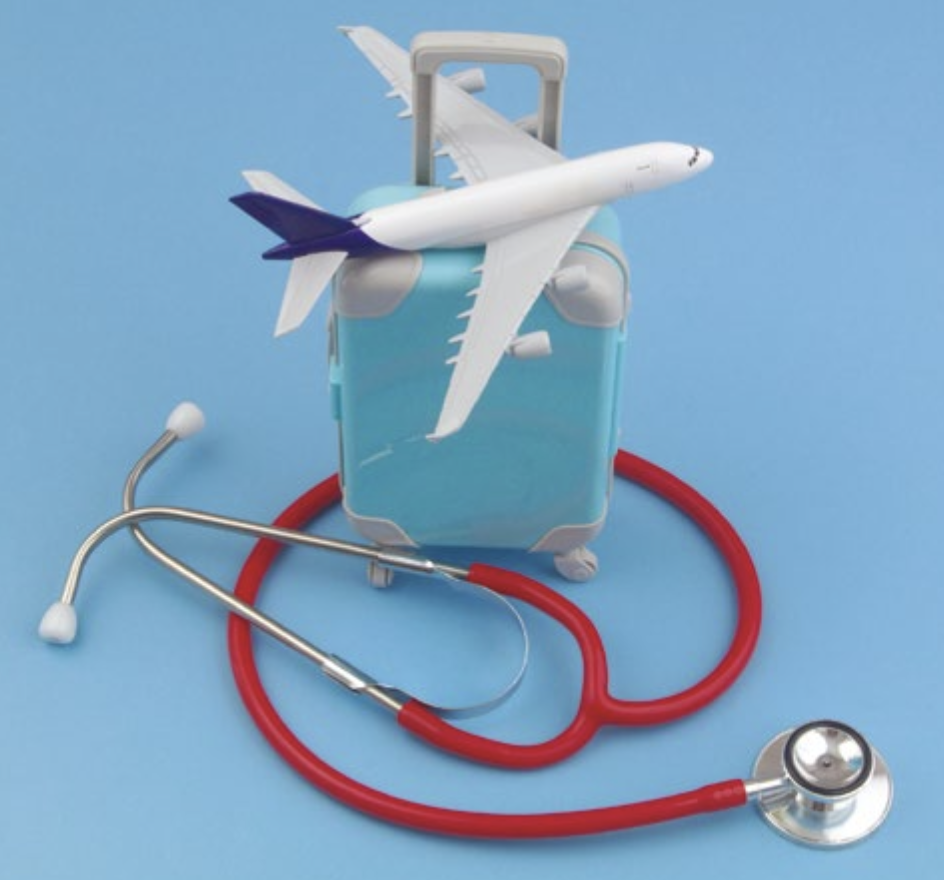By Wendy Haaf
You can’t prevent a disease once you’ve got it
After months of budgeting, itinerary planning, and booking, you’re in the midst of the vacation you’ve been dreaming of—only to find yourself so violently ill that you can’t venture beyond the bathroom in your hotel room or vacation rental.
This is just one example of how a travel-related disease or condition can ruin your holiday, and it’s surprisingly common: according to a 2024 analysis of 10 studies, between 20 and 56 per cent of international travellers will develop traveller’s diarrhea during trips of under 100 days. However, by doing a little research well in advance of your departure and taking some simple precautions, you can greatly reduce your chances of getting sick so you can relax and enjoy your getaway.
1. An Early Start
One key measure is starting your preparations early enough, says Dr. Kishor M. Wasan, an adjunct professor and distinguished university scholar in the Department of Urological Sciences at the University of British Columbia’s Faculty of Medicine and the cofounder and co-director of the Neglected Global Diseases Initiative at UBC. Since it takes time for vaccines to take effect, and some require two doses one month apart, he recommends seeking expert advice “a minimum of six to eight weeks before departure.”
If you have a chronic health condition of any kind— even if it’s been stable for a long time—it’s a good idea to consult your specialist, says Dr. Anne E. McCarthy, a professor of medicine at the University of Ottawa, director of Ottawa Hospital’s Tropical Medicine and International Travel Clinic, and president-elect of the International Society of Travel Medicine. For instance, she says, “if I ever had angina, or had been given nitroglycerine, even if I hadn’t used it for years, I would get a new prescription to take with me.” The same goes for asthma inhalers and medications to treat allergic reactions—including epinephrine injectors.
Similarly, if you take biologic drugs for an autoimmune disease such as rheumatoid arthritis, you may need to time vaccinations more carefully, take extra precautions, or formulate plans for possible flare-ups. (Disease-specific online communities are a good source of travel tips.)
Sometimes, a visit to your primary-care provider may be all that’s necessary. “For some trips, like to somewhere in Mexico, you can see your nurse practitioner or family physician for advice,” McCarthy says. “For more complicated travel, you should really see somebody with expertise in travel medicine.” Health professionals with this training stay up to date on preventive strategies recommended for specific destinations, and they can tailor advice to your individual health status and other factors, such as any medications you might be taking. For example, she says, “if I see four people who are going to the same place, I might recommend three different drugs [to ward off malaria]. It really does take an individual assessment.”
Since you’ll have to pay out of pocket for a consultation if you don’t have private insurance coverage, McCarthy recommends building that cost, and those of any travel-specific vaccines, into your trip budget, just as you do for travel insurance. (If you’re not sure where to find a travel clinic, one place to ask is your local pharmacy—some pharmacists take the training necessary to receive a certificate in travel health.)
2. The Vaccines You Need
What kind of conditions and diseases can you contract while travelling, and what measures do you need to take to protect yourself? “The conditions fall into three main categories,” Wasan says. “Number one would be respiratory diseases. Number two would be water- and food-related viral, bacterial, and parasitic infections. And the third would be mosquito-borne illnesses.” Many routine vaccines protect against respiratory infections, so it’s important to ensure that those are up to date.
Regardless of where you’re going, “I would recommend influenza and COVID-19 vaccines,” Wasan says. Similarly, you need a diphtheria booster if it’s been 10 years since your last one. (This is often combined with the tetanus vaccine, which needs to be updated on the same schedule.)
In addition, “older people should have their pneumonia vaccine—hopefully the newer one,” says McCarthy, since it protects against more strains. She also recommends getting vaccinated against respiratory syncytial virus (RSV). Several provincial health plans cover the vaccine for certain groups of older adults; however, if you don’t qualify, you’ll have to pay out of pocket unless you have a private drug plan that covers it.
If you didn’t have measles when you were a child, you should consult your primary-care provider. According to Health Canada, while adults born before 1970 are generally presumed to have acquired natural immunity, some may be susceptible. Since measles cases are surging in Canada and Europe, at least one provincial public health department—New Brunswick’s—is encouraging people born prior to 1970 to consider getting one dose of the measles, mumps, and rubella (MMR) vaccine before a journey, though it isn’t publicly funded.
Respiratory vaccines are especially important “if you’re going on a cruise, because they’re notorious for outbreaks of respiratory illness as well as diarrheal illness,” McCarthy says. “Another vaccine that I think is important, almost anywhere you travel, is for hepatitis A.” Transmitted by close contact with an infected person or by consuming contaminated food or water, hepatitis A is one of the most common vaccine-preventable infections acquired during travel, according to the US Centers for Disease Control and Prevention, and can occur in travellers “to developed and developing countries and who have standard tourist accommodations, eating behaviours, and itineraries.”
A hepatitis A infection can cause problems more serious than just a bout of diarrhea. Unlike other strains of hepatitis, it doesn’t cause chronic liver disease, but “once you’re over 55, you could actually die from acute infection, so it’s not something to take lightly, and it’s 100 per cent preventable,” McCarthy notes. One dose of hepatitis A vaccine provides a year of protection. Two doses—a second is recommended between six and 12 months after the first, although it can be delayed—defends against infection for much longer. Research suggests that the two-dose series protects adults for at least 20 years. Since routine early-life vaccination programs for hepatitis B weren’t rolled out until well after Canadians 55 or older reached adulthood, your travel-health provider may recommend getting immunized for this as well. (A combination hepatitis A and B shot is available.)
Spread through exposure to infected blood and other bodily fluids, the viral infection can be picked up via activities such as tattooing or poor infection control during medical procedures. According to the Canadian Immunization Guide, the hepatitis B vaccine should be particularly recommended to travellers who will be residing in areas where the prevalence of hepatitis B infection is high—such as the Middle East, South America, and Central Asia.
For destinations where Japanese encephalitis or yellow fever are present, vaccines for these mosquito-borne illnesses may also be recommended, depending on factors like the season and the length of your trip. And certain countries in sub-Saharan Africa and South America actually require that you present proof of yellow-fever vaccination upon entry. Since the yellow-fever vaccine contains live virus, it’s generally not recommended for people with a weakened immune system. “If you can’t get the vaccine, it doesn’t necessarily mean you can’t travel, but you certainly have to have a conversation with a travel-health provider who has expertise in how to prevent yellow fever and how to get proper documentation,” McCarthy says. Otherwise, you may be turned back at the border.
3. Other Medications
Your travel-health provider may prescribe certain medications prior to your departure, too. For instance, if you’re going to an area where malaria occurs (this includes Southeast Asia and parts of the Caribbean), they may advise you to take a preventive medication. “In countries where malaria is really a danger, they don’t have the luxury we have for prevention, so they’re working on treatment an managing life-threatening infections,” McCarthy says.
“They may not have the medicines you need for prevention, and the treatment ones don’t work for prevention.” Another situation that may warrant obtaining medication in advance is if you’re flying into a high-altitude destination (above 2,400 metres) or your itinerary involves a rapid ascent. It takes the body time to adjust to the increased difficulty obtaining adequate oxygen due to low air pressure. Altitude sickness, which occurs when someone goes too high too fast, can cause symptoms ranging from headache and dizziness to a dangerous fluid buildup in the lungs or brain, depending on severity. While it’s best to allow your body time to acclimate—for instance, by staying overnight at a medium elevation—you may want to discuss medication options for preventing or lessening symptoms with your primary-care provider.
In some circumstances, your travel-health provider might suggest carrying a “just in case” prescription medication (such as the antibiotic azithromycin) for treating severe diarrhea, to be used only if needed.
One non-prescription item you may need to stock up on as part of your pre-departure preparation is an effective insect repellent—preferably one containing DEET. “In many places now, there are different insect-borne infections you can get,” McCarthy says. “Some of them are trip-ruining, and some might have long-lasting consequences.” Chikungunya, for instance, which is spread by infected mosquitoes, can cause rheumatoid-arthritis-like symptoms “for months to years,” she explains. Midges in some areas, such as Cuba, can carry oropouche virus; the infection causes symptoms such as fever, severe headache, and joint pain. “I call DEET my tropical perfume,” she says. “You put your sunscreen on, let that soak in for 20 minutes, and then put on repellent.” You may also want to look into buying clothing that’s been pretreated with repellent—these items are sold in some outdoor stores.
In some countries, you can also purchase permethrin (which isn’t licensed in Canada) for a DIY clothing treatment. “Hang your clothes up outside, soak them with spray on both sides, let them dry, and they’re usually good for four to six weeks with washing,” McCarthy explains.
Your travel-health provider can also point you towards resources outlining any precautions to take during your trip. These might include washing any raw fruits or vegetables with bottled or boiled water and avoiding sprouts (these can absorb contaminated water) and undercooked meat or seafood, limiting outdoor activities during times when disease-carrying insects are active, and wearing footwear on beaches frequented by local dogs and cats. Since these animals may not be dewormed, you may be at risk for picking up hookworm larva, which can burrow under the skin. “It’s not dangerous, but it can be quite itchy and disturbing,” McCarthy explains.
Finally, “if you really want to be proactive, you can create your own travel health kit, and your pharmacist can help you do so,” Wasan says. Items to consider packing include over-the-counter medications for pain, diarrhea (such as Imodium), and nausea (such as meltunder-the-tongue Gravol tablets), and rehydration salt packets. Wasan suggests adding masks and alcohol-based wipes or hand sanitizer to your shopping list.
“There aren’t a lot of absolutes with respect to travel medicine,” McCarthy says. “The risks you might accept may be different from those I do, but you do want to make an educated decision.” Whatever you choose, doing your homework ahead of time is key. “I’ve travelled when I’ve not been prepared, and I’ve gotten sick and had a miserable time,” Wasan says. “On the other hand, when I’ve been prepared, I’ve had a wonderful experience.”






